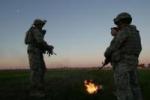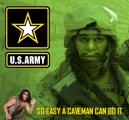The “Value” assigned to Advising
This gets to the question of where does an assignment as an “advisor” fall out in terms of being ascribed as “key developmental” or KD toward future assignment and promotion. This is a question as to if the “value” is such that it has persistent and future value, vs. its being just an assignment that must be endured temporarily or tolerated until such time as we can return to what we have institutionalized and demonstrated as having value through our actions. It gets beyond the CSA’s making it a KD assignment and giving CSL credit; it is about how we perceive its worth.
There are three parts to this I think. The first part is recognition and acceptance by the institutional leadership that there is a persistent requirement for both quality and quantity. In this case OIF and OEF have changed our (the USG’s) thinking to include accepting and expressing that working by, with and through FSFs is an undeniable and critical part of our strategy. I say that because while many may have expressed it for some time, it was not until it physically manifested itself and exposed our gaps in capabilities and capacities that we were forced to address it – preparation for war, and the conduct of war were and will remain different. The institution has officially recognized and accepted this need in the form of the CSA’s, CMC’s and SECDEF’s verbal and written communications. This sets the conditions for the second part, reconciling recognition with actions.
How the institutions go from articulating value to demonstrating it matters. To borrow from Dave Kilcullen (first place I heard it) – it is about matching our actions to our narrative. If the Army does what is laid out in CSA’s note in spirit as well as in letter by advancing those who have taken on his guidance in the next round, it will demonstrate immediate value. Two other actions the Army might take is to:
- One, follow the Joint lead and designate an Army proponent for SFA (Security Force Assistance) that reflects its value to big Army – not just a special slice. That is not a swipe at Army Special Forces – but it’s a recognition that when you make something “special” you may also isolate its level of institutionalization – since this as much a capacity issue as a capability issue it is a GPF issue, and if institutionalization in the GPF is what is required then designating a proponent that only affects a special slice or creating a specialized corps of advisors jeopardizes that. At its heart this is about how we perceive and view the employment of “Land Power” which why I think the CSA is explicit in mentioning it in his email.
- Two provide commanders a powerful tool for organizing their formations to the tasks associated with working with FSFs, we need to assign some type of ASL or personnel code to all soldiers, not just officers. We have many soldiers working in some advisory capacity who not only should get some credit for their work, but whose skill sets might get lost. These soldiers could become unit trainers, etc. and when the unit gets assigned the mission may prove invaluable in an advisory position vs. their primary MOS. This is not about identifying them for unit taskings, its about empowering commanders with critical tools to the benefit of the mission.
The third part and I think the most institutionally enduring, and also the most difficult is how its value translates to big Army. When a LT or CPT looks to a successful BN or BDE S3, or his BN CDR or BCT CDR and attributes that leader’s success to a tour as an advisor, it is truly institutionalized. When that BCT CDR pulls off something and that CO CDR says, “Damn Sir – where did you learn that?”, and the BCT CDR says “I picked it up advising foreign security forces in ……” and then follows with, “ you know Bill, you should consider a tour as an advisor when you leave command, it will round you out in ways no other job can.” we’ll have made it a part of our culture. When its recognized as part of the path to higher command because its value to the challenges of command at those levels is not only viewed as enhancing, but is undeniable it will be part of our culture. At that point value is established because its credibility is manifested in what we value most. At that point it is not a painful forcing function which must be endured, but it is an attractive function which is desired. We resist those things which take us away from our goals, but we find ways to those things which lead us to our goals.
It is also worth discussing the issue of making some advisory positions “KD” and thus on par with other relevant jobs. While the job of S3 or XO has value in preparation for command, what of the comparative value of the Advisor if a guy or gal can only do one or the other? I think here it comes down to two things. First, we need to get beyond valuing the quality of the assignment to the exclusion of the quality of the man. An assignment does not qualify someone for increased responsibility and authority – I’ve known at least one FG who served as both a BN 3 and a BN XO, and got BN CMD only to fail – a good guy, but we all knew he should not have been a BN CDR even if the Army did not. I’ve also known a few folks that did not have the resume but their actions could not be more in keeping with increased responsibility and authority – the Army missed them to our detriment. We’ve got to get more invested in how we assess those we advance. Second we need to consider what we think we’re going to be doing in the future, since nobody can do everything, maybe having a balanced team vs. a one size fits all is healthier for our organization. If having relevant land power in the future is at least partially contingent on our ability to work by, with and through, then having that experience resident in the BN and BCT senior leadership would seem critical. I’d argue that there are things you will learn as an advisor that you will not learn elsewhere – so maybe its value to the future of land power was worth making it a KD job. However, if we have leaders that when a guy shows up the first question out of their mouth is not oriented on finding out what do they bring to the table, but where were they an S3 or XO, then we really did not institutionalize it as “KD”, we just gave it a wink and a nod, and we failed.
Conclusion (what it means more broadly)
I think this is one of the reasons why I think BCTs should be the basis for a good chunk of our Army SFA efforts. Not only do we require full spectrum forces in order meet the commitment to our national security, and not only do we have some incredibly talented folks in the BCT, but to really effect cultural change we must change some part of what we value most, not create an alternative value structure which is in competition. When we do the latter we weaken one at the expense of the other. I think we can in fact leverage existing structures such as the BCT and the JTF to meet most of our needs. While the BCT does in fact have a ceiling with regards to its functionality, we might consider building a CJIATF around something like a TMAAG, but inclusive of a heavy JIIM (Joint Inter-Agency, Inter- Governmental and Multi-National) assessment team, and then based on the initial assessment and follow on re-assessments build the capabilities and capacities required to meet the policy goal.
I bring this up in the conclusion because in my view it’s a related issue. Creating new permanent organizations does not necessarily change the organizational culture. It is really about relevance and perspective to a frame of reference. We have assigned both relevance and value to the BCT and to the JTF; where possible we should show the increased value with respect to established frames of reference. In the case of using the CJIATF structure on which to build the means for sustained engagement, it would require a CJIATF CDR who understood how to work with foreign security forces. To get there we need to institutionalize the value at the lower echelons first. The CSA’s directive may not in and of itself assign the level of value that gets instant institutionalization, but its an important first step, and one we can build on.
Best, Rob













 )
) 



Bookmarks